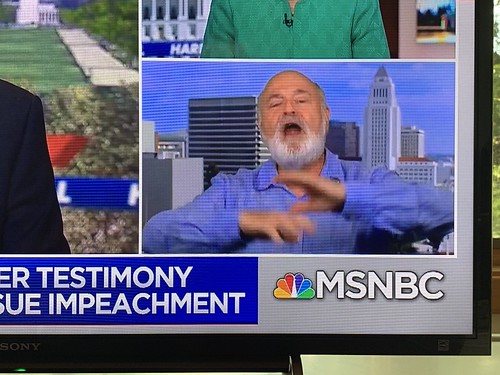Part 1, earlier this morning:
"Trump steals their word: Normalize."
Now, I want to look at the history of the word "normalize." It makes me think of the sort of words that
Strunk and White disapproved of:
-ize. Do not coin verbs by adding this tempting expression. [...] Never tack -ize onto a noun to create a verb. Usually you will discover that a useful verb already exists. Why say “moisturize” when there is the simple, unpretentious word moisten?
They even single some
-ize words out:
Finalize. A pompous, ambiguous verb....
Personalize. A pretentious word, often carrying bad advice. Do not personalize your prose; simply make it good and keep it clean.
Makes me feel like singing
the Bob Dylan song:
I ain’t lookin’ to block you up
Shock or knock or lock you up
Analyze you, categorize you
Finalize you or advertise you
All I really want to do is, baby, normalize you.
The OED traces
normalize back to 1864,* to a New York Times article about the abuse of government power:
"These attempts to normalize despotism display the impotency as well as the malignity of the Executive." Here's the article,
"Prussian Politics."
Measures to confirm and legalize the most arbitrary acts of the recess have been prepared and introduced into both Houses. A new anti-press bill, which embodies some of the most oppressive and odious provisions of the ordinances, has been carried through the Herrenhaus; while a projet de loi, which will entitle the Minister to raise revenue and make disbursements as often as the Deputies decline to sanction his budget, is before the Second Chamber, and will form the first subject for debate after the holidays. These attempts to normalize despotism display the impotency as well as the malignity of the Executive, for, of course, neither one measure nor the other will ever become law.
Normalize there meant to pass laws that would support what the government was doing. It's a synonym of "legalize," which also appears in that paragraph. The word "legalize" is no neologism. It goes back to the 1600s.
And, by the way, "finalize" was a new-ish word when Strunk and White bitched about it. (The OED says 1919.) "Personalize" goes back to the 1700s, if the idea is to represent something as a person — e.g., "The Poets are fond of personalizing both physical and moral Qualities" — but the annoying meaning begins in advertising with this bit of crap from 1910:
The Calvert label in a garment..identifies the best there is in Clothing Woolens; the highest grade of modeling and making. They've got the snap and the style that personalizes them; they've got the intrinsic worth that substantializes them.
As for "substantialize" — which looks quite idiotic to my modern eyes — it goes back to the 1700s. ("A sedate yet fervent sense of gratitude towards God... substantialized in the practice of every Christian virtue.")
The OED has an entry on the "-ize" suffix. The earliest word seems to be "baptize." There's a set of words that came to English from the Greek, and perhaps words with this pedigree are more... normal:
characterize, crystallize, harmonize, idolize, monopolize, organize, stigmatize, symbolize, systematize, tantalize, agonize, apologize, philosophize, sympathize, theorize....
Can't object to those great words! They're not pompous or pretentious. They're solid English words, words that make you glad English is your native tongue.
The OED make a separate category out of words that came to English from Latin:
actualize, authorize, brutalize, civilize, colonize, familiarize, fertilize, formalize, fossilize, humanize, immortalize, legalize, memorize, nationalize, naturalize, neutralize, patronize, pulverize, realize, satirize, scrutinize, solemnize, sterilize, terrorize, vocalize....
They start to look weird when you see them all together, but these are also great words.
But is there some rule against creativity here, something wrong with ize-izing beyond the Greek and Latin? What bugged Strunk/White so much? The OED lists words "from later sources":
bastardize, jeopardize, villanize, womanize....
And words based on ethnicities —
Americanize, Anglicize — and names —
Bowdlerize, galvanize, mesmerize — and substances —
carbonize, oxidize — and some odd "recent uses" like "The troop of nakedized children rushed downstairs" (from 1885).
Now, I have to go get dressed. I've got places to go, appointments to keep.
Please keep up the conversation. Verbalize. Conversationalize. Scrutinize Donald Trump and help determinize whether he ought to be normalized or Hitlerized... if you can believe your own eyes.
______________________________
* There's one earlier medical use of the term from 1847, but I'm going to ignore that. If I was going to take a tangent here, it would be about the use of normalize in a couple of famous fairly recent novels:
Erica Jong "Fear of Flying" (1974): "You always insist on normalizing your life."
Bret Easton Ellis, "American Psycho" (1991): "One should use an alcohol-free antibacterial toner with a water-moistened cotton ball to normalize the skin."




